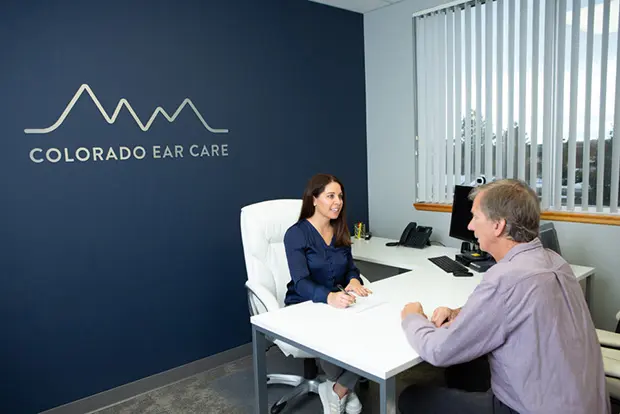OTC Hearing Aids in Denver and Surrounding Areas
Explore Over-the-Counter Hearing Technology with Colorado Ear Care
OTC hearing aids are a newer class of hearing devices designed to be sold directly to consumers without the need for a professional hearing evaluation or fitting. These devices are intended for adults with perceived mild to moderate hearing loss and can typically be purchased online or at retail stores.
Common Questions About OTC Hearing Aids
How Do OTC Hearing Aids Work?
Like traditional hearing aids, OTC devices are built to help users hear better, especially speech in noisy environments. However, they are not custom-programmed based on a comprehensive hearing test and may not provide the same level of performance or personalization as prescription hearing aids.
Are OTC Hearing Aids Right for You?
OTC hearing aids may be suitable if:
- You have trouble hearing in specific situations, like group conversations or noisy restaurants.
- Your hearing loss is mild to moderate.
- You are comfortable managing your hearing device without professional support.
They are not recommended for individuals who:
- Have sudden or rapidly worsening hearing loss
- Experience tinnitus or ringing in the ears
- Suffer from vertigo or balance issues
- Have impacted earwax or ear pain
- Have been diagnosed with moderate to severe hearing loss
If you fall into any of the categories above, we strongly encourage you to consult with an audiologist before purchasing any device.
Are OTC Devices Regulated?
Yes, OTC hearing aids are regulated by the U.S. Food and Drug Administration (FDA). These regulations are designed to ensure safety, standardize labeling, and make clear when consumers should seek professional help.
It’s important to note that PSAPs (Personal Sound Amplification Products) are not the same as OTC hearing aids. PSAPs are not FDA-regulated and may even cause further damage if misused.
Why Choose a Professional Over OTC?
While OTC devices offer convenience, they lack the personalization and clinical support provided by a licensed audiologist. At Colorado Ear Care, we believe hearing care should never be one-size-fits-all. Our team provides:
- Comprehensive diagnostic testing
- Customized device selection and fitting
- Ongoing support and adjustments
- Patient education to improve long-term outcomes
Your hearing health is too important to leave to guesswork.
Can OTC hearing aids treat noise-induced hearing loss?
In most cases, no. Noise-induced hearing loss often requires more advanced treatment than what OTC devices can provide. A professional evaluation is strongly recommended.

